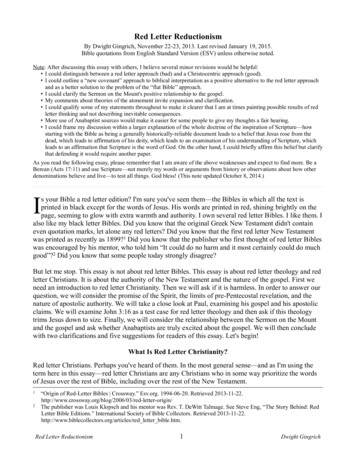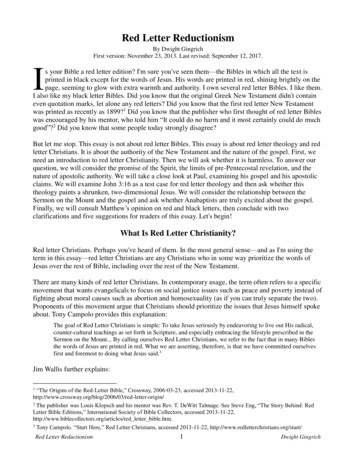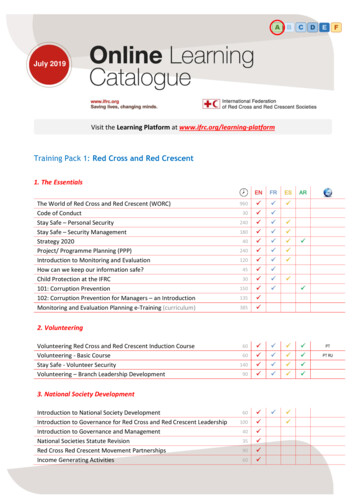
Transcription
Red Letter ReductionismBy Dwight Gingrich, November 22-23, 2013. Last revised January 19, 2015.Bible quotations from English Standard Version (ESV) unless otherwise noted.Note: After discussing this essay with others, I believe several minor revisions would be helpful: I could distinguish between a red letter approach (bad) and a Christocentric approach (good). I could outline a “new covenant” approach to biblical interpretation as a positive alternative to the red letter approachand as a better solution to the problem of the “flat Bible” approach. I could clarify the Sermon on the Mount's positive relationship to the gospel. My comments about theories of the atonement invite expansion and clarification. I could qualify some of my statements throughout to make it clearer that I am at times painting possible results of redletter thinking and not describing inevitable consequences. More use of Anabaptist sources would make it easier for some people to give my thoughts a fair hearing. I could frame my discussion within a larger explanation of the whole doctrine of the inspiration of Scripture—howstarting with the Bible as being a generally historically-reliable document leads to a belief that Jesus rose from thedead, which leads to affirmation of his deity, which leads to an examination of his understanding of Scripture, whichleads to an affirmation that Scripture is the word of God. On the other hand, I could briefly affirm this belief but clarifythat defending it would require another paper.As you read the following essay, please remember that I am aware of the above weaknesses and expect to find more. Be aBerean (Acts 17:11) and use Scripture—not merely my words or arguments from history or observations about how otherdenominations believe and live—to test all things. God bless! (This note updated October 8, 2014.)Is your Bible a red letter edition? I'm sure you've seen them—the Bibles in which all the text isprinted in black except for the words of Jesus. His words are printed in red, shining brightly on thepage, seeming to glow with extra warmth and authority. I own several red letter Bibles. I like them. Ialso like my black letter Bibles. Did you know that the original Greek New Testament didn't containeven quotation marks, let alone any red letters? Did you know that the first red letter New Testamentwas printed as recently as 1899?1 Did you know that the publisher who first thought of red letter Bibleswas encouraged by his mentor, who told him “It could do no harm and it most certainly could do muchgood”?2 Did you know that some people today strongly disagree?But let me stop. This essay is not about red letter Bibles. This essay is about red letter theology and redletter Christians. It is about the authority of the New Testament and the nature of the gospel. First weneed an introduction to red letter Christianity. Then we will ask if it is harmless. In order to answer ourquestion, we will consider the promise of the Spirit, the limits of pre-Pentecostal revelation, and thenature of apostolic authority. We will take a close look at Paul, examining his gospel and his apostolicclaims. We will examine John 3:16 as a test case for red letter theology and then ask if this theologytrims Jesus down to size. Finally, we will consider the relationship between the Sermon on the Mountand the gospel and ask whether Anabaptists are truly excited about the gospel. We will then concludewith two clarifications and five suggestions for readers of this essay. Let's begin!What Is Red Letter Christianity?Red letter Christians. Perhaps you've heard of them. In the most general sense—and as I'm using theterm here in this essay—red letter Christians are any Christians who in some way prioritize the wordsof Jesus over the rest of Bible, including over the rest of the New Testament.12“Origin of Red-Letter Bibles Crossway.” Esv.org. 1994-06-20. Retrieved d-letter-origin/The publisher was Louis Klopsch and his mentor was Rev. T. DeWitt Talmage. See Steve Eng, “The Story Behind: RedLetter Bible Editions.” International Society of Bible Collectors. Retrieved /red letter bible.htm.Red Letter Reductionism1Dwight Gingrich
There are many kinds of red letter Christians. In contemporary usage, the term often refers to a specificmovement that wants evangelicals to focus on social justice issues (peace, elimination of poverty, etc.)instead of fighting about moral causes (abortion, homosexuality, etc.). Proponents of this movementargue that Christians should prioritize the issues that Jesus himself spoke about. Tony Campoloprovides this explanation:The goal of Red Letter Christians is simple: To take Jesus seriously by endeavoring to live out His radical,counter-cultural teachings as set forth in Scripture, and especially embracing the lifestyle prescribed in theSermon on the Mount. By calling ourselves Red Letter Christians, we refer to the fact that in many Biblesthe words of Jesus are printed in red. What we are asserting, therefore, is that we have committed ourselvesfirst and foremost to doing what Jesus said.3Campolo and his supporters represent a theologically liberal version of red letter Christianity. Theyshare some similarities with classic liberal Protestants, who have often found Paul rather distasteful,thanks to his “narrow” views about such matters as gender roles and his insistence on doctrinalprecision. Some have even insisted that Paul and his supporters misinterpreted Jesus, turning his Jewishrenewal movement into a new religion called Christianity, complete with hierarchical leadershipstructures.But there is also a conservative kind of red letter Christianity—indeed, an Anabaptist kind—and that isthe focus of this essay. These conservative red letter Christians are not a cohesive movement. They arenot all alike. But if you listen long enough, here are some things you will sometimes hear. Mostobviously, like Campolo, they will emphasize the Sermon on the Mount. Like Campolo, they wish todistance themselves from traditional evangelical doctrinal camps and lifestyles. Unlike Campolo, theywill probably be careful to teach all the commands found throughout the entire New Testament. Unlikeclassic Protestant liberals, they will insist strongly that Jesus and Paul agree. In fact, they will probablyinsist in the abstract that Jesus and Paul not only agree, but—what is more—that they teach the samething. In actual practice, however, these Christians typically define this “same thing” by using thewords of Jesus, not Paul. They are much happier to use Jesus' language of discipleship than Paul'slanguage of justification by faith. Emphasis on the latter, some insist—or at least on the traditionalProtestant doctrine of “faith alone”—has resulted in nominal Christians who think they can pray the“sinner's prayer,” be “born again,” and sin their way happily to heaven. “Believe on the Lord JesusChrist, and thou shalt be saved” (Acts 16: 31 KJV) seems just a little too easy. For similar reasons, John3:16 is not usually a favorite verse of these Christians. These Christians are most at home when readingthe first three Gospels.These conservative red letter Christians are often suspicious of theology. They are happy to mine theentire New Testament for commands, but they tend to spend little time on the theological chapters, suchas Ephesians 1-3. Romans 12 (“be not conformed,” KJV) is a welcome friend, but Romans 1-11 areseldom explained with care and deep understanding. They often warn against “quarrels about words”(1 Timothy 6:4) but are less likely hold up Paul's example of “reasoning and persuading. about thekingdom of God” (Acts 19:8) or his admonition that elders must “be able to give instruction in sounddoctrine and also to rebuke those who contradict it” (Titus 1:9). Sometimes you get the sense that theseChristians think that what you believe (theology) is less important than what you do (ethics). Don't be atheologian; do be a disciple. What is most important are the example and teachings of Jesus. Theancient creeds and many evangelicals today emphasize the beginning and end of Jesus' life—theincarnation and the atonement—Jesus is primarily our Savior. In contrast, many liberal theologiansdoubt the incarnation and the atonement, focusing only on the middle of Jesus' life—Jesus is reduced to3Campolo, Tony, “Start Here.” Red Letter Christians. Retrieved 2013-11-22. http://www.redletterchristians.org/start/Red Letter Reductionism2Dwight Gingrich
a great Teacher and Social Liberator. Conservative red letter Christians mention Jesus' role as Savior,but emphasize his role as Teacher and Example. The primary command is not “believe” but “follow.”Conservative red letter Christians read the entire Bible through the life and teachings of Jesus as foundin the Gospels. How can one correctly interpret the Bible? By beginning and ending with Jesus. Use hisactions to interpret his words, and use his words to interpret his actions. Use both to interpret everyother biblical text. In particular, be sure every interpretation harmonizes with the Sermon on the Mount.This is the “Constitution of the Kingdom of God.” Indeed, the Sermon on the Mount, they may say,reveals the very heart and essence of Christianity, just as Jesus himself reveals the very nature of God.Is Red Letter Christianity Harmless?What should we make of this conservative red letter Christianity? Clearly, there is much good toaffirm—especially the emphasis on living as fully devoted disciples of Christ. Red letter disciples willhelp you spot the idols in your own heart. They will alert you to heavenly rewards. They make youeager to live in such a way that God's kingdom comes and his will is done on earth as it is in heaven.But can we confidently say that this red letter Christianity “could do no harm”?The promise of the Spirit and the glory of Jesus: “I still have many things to say to you”Perhaps the best place to begin our answer is with some red letters from the Gospel of John. Here's thescene: It is the final evening before Jesus' crucifixion. He is spending it alone with his closest disciples.No one else is present. Even Judas has left. In this intimate setting, Jesus tells the eleven, “No longerdo I call you servants, for the servant does not know what his master is doing; but I have called youfriends, for all that I have heard from my Father I have made known to you” (John 15:15). Reread thatlast clause: “All that I have heard from my Father I have made known to you.” Can you imagine astronger endorsement for red letter Christianity? After all, do we need to know more than Jesus knows?If we rewind the audio from this final evening a little, we hear this: “These things I have spoken to youwhile I am with you. But the Helper, the Holy Spirit, whom the Father will send in my name, he willteach you all things and bring to your remembrance all that I have said to you” (John 14:25-26). Noticefirst the promise of the Holy Spirit; something—no, Somebody—is coming. He is coming in Jesus'name—delegated as Christ's authoritative representative. What will he do? He will “bring to yourremembrance all that I have said to you.” What does this mean? Among other things, surely it meansthat the four Gospels we hold today were written under the guidance of the Holy Spirit; they areaccurate records of what Jesus said. So again, it seems we can rest easy as red letter Christians.But we skipped a clause: “He will teach you all things.” What does this mean?If we fast-forward the audio toward the end of the evening, we hear this: “I still have many things tosay to you, but you cannot bear them now. When the Spirit of truth comes, he will guide you into allthe truth, for he will not speak on his own authority, but whatever he hears he will speak, and he willdeclare to you the things that are to come. He will glorify me, for he will take what is mine and declareit to you” (John 16:12-14). “Many things”! Do you feel the force of these words? Jesus still had manythings to say to his disciples, but he was unable to say them, because they were unable to bear them.What a tragedy! What a loss! If only the disciples had been mature enough to receive all Jesus' words!Doesn't this make you want to crawl back through time and shake the disciples—knock some spiritualsense into their dull heads? Because of their stupidity, we will never know everything Jesus wished totell us. Right?Red Letter Reductionism3Dwight Gingrich
But wait. Again we have a promise of the Spirit. “He will guide you into all the truth.” What does thismean? When were the apostles guided by the Spirit into all the truth? What truths were they givenunder the Spirit's inspiration? What did the Spirit take that belonged to Jesus (“he will take what ismine”) and deliver with the full authority of Jesus (“he will not speak on his own authority”) to theapostles? Where can we find those Spirit-borne, apostle-received teachings of Jesus today? Surely wefind them in the writings of the New Testament—in the sermons of Acts, in the epistles, and inRevelation. And surely we find them even in the “editorial comments” and explanations included in theblack words of the four Gospels. Here, at least in part, are the “many things” that Jesus wanted hisdisciples to know.Note carefully: the truth that the Spirit would speak to the apostles would be just as authoritative as thewords spoken by Jesus while he was on earth. “He will not speak on his own authority.” Just as Jesustold his disciples “all that [he had] heard from [his] Father,” so the Spirit would speak “whatever hehears” from Jesus. Why would we say that some of Jesus' words (in the Spirit-inspired apostolicwritings) are not as authoritative as others (those he spoke in the flesh)? Note also: “He will glorifyme”; the result of the Spirit's teaching would be the glorification of Christ. Thus, to raise the red letterportions of Scripture above the rest is to risk detracting from the full glory of Christ. True, Jesus' lifeand teachings are the climax of Scriptural revelation; we are no longer under the old covenant. True, allour Scriptural interpretations must harmonize with Jesus' life and teachings. And true, some words ofScripture are clearer than others and thus carry more interpretive weight. Yet, if we believe with Pauland Peter that all Scripture is given by inspiration of God (2 Tim 3:16; 1 Pet. 1:21; 2 Pet. 3:15-16), thenthis passage from John suggests that all the words of Scripture—including those written by theapostles—are equally authoritative. To deny this hardly squares with Jesus' claim that the Spirit's wordsare as authoritative as his own earthly words—that the Spirit's words come from the Father and fromChrist himself.The limits of pre-Pentecostal revelation: “Are you also without understanding?”So what did Jesus still want to say to his disciples? “Many things”! Consider the blindness of thedisciples throughout Jesus' earthly ministry. For example, let's survey just four chapters: Mark 6through 9. After Jesus fed the five thousand, the disciples were “utterly astounded” to see him walk onthe water and calm the sea; “for they did not understand about the loaves, but their hearts werehardened” (6:51-52). When the disciples asked Jesus to explain a parable, he said, “Then are you alsowithout understanding? Do you not see.?” (7:18). When they misunderstood Jesus' word picture aboutthe leaven of the Pharisees, he seemed positively frustrated with them: “Do you not yet perceive orunderstand? Are your hearts hardened? Having eyes do you not see, and having ears do you not hear?And do you not remember? When I broke the five loaves for the five thousand, how many baskets fullof broken pieces did you take up?. And the seven for the four thousand, how many baskets full ofbroken pieces did you take up?. Do you not yet understand?” (8:17-21). After Jesus taught thedisciples about his coming death and resurrection (“and he said this plainly”), Peter rebuked Jesus,earning another rebuke: “Get behind me, Satan!” Despite Peter's earlier proclamation that Jesus is theChrist, he was still extremely confused about who the Christ would be (8:32). A few days later, on themount of transfiguration, Peter suggested they honor Moses and Elijah as equals with Jesus, “for he didnot know what to say” (9:6). Many similar examples could be added from other passages.Given how blind the disciples were, we should not be surprised that there were “many things” thatJesus was unable to say. The disciples seemed unable to accept even the bare physical facts about Jesus'coming death and resurrection. It is no wonder that Jesus never tried to give a full theologicalRed Letter Reductionism4Dwight Gingrich
explanation of the atonement! Thus, to argue against penal substitutionary atonement on the basis thatyou can't find it in Jesus' own teachings4 is to badly misunderstand the flow of redemptive history. It ismaking the same interpretive error as those who claim that Jesus wasn't divine just because they don'tthink Jesus ever explicitly said so himself—they think Paul invented the idea.It took time for the disciples to understand the theological implications of Jesus' ministry, death, andresurrection. For example, when Jesus road into Jerusalem on a donkey, “his disciples did notunderstand these things at first, but when Jesus was glorified, then they remembered that these thingshad been written about him and had been done to him” (John 12:16). Notice five things: First, noticethat the disciples did not understand Jesus' actions until after Jesus' death and resurrection (when he“was glorified”). Second, notice that they did not understand the Old Testament or its relationship toJesus until after that time, either. This means, third, that Jesus' death and resurrection were an essentialturning point that made understanding possible. Fourth, notice that the Old Testament served as the lensthat explained the significance of Jesus' actions—the Old Testament! Not the words of Jesus alone oreven the rest of the New Testament (which the apostles themselves were to write later). Fifth, noticethat John does not clearly explain in this immediate context what it was that the disciples eventuallyunderstood about Jesus' actions. John does briefly explain some of this understanding at other points inhis Gospel (see John 1:1-14 and 20:30-31), but he leaves many theological truths cryptically encoded.If we compare John with the other three Gospels, we find that the others contain even less explicittheological explanation. Indeed, if we possessed only the first three Gospels, it is doubtful if many ofus would understand much at all about Christ's saving work. None of the resurrection accounts, forinstance, say anything like “Jesus rose from the grave and therefore we can be sure that we, too, will begiven resurrection bodies.” Yet that point is emphasized many times later in the New Testament as afocal point of Christian hope. It is only as we look back at the four Gospels with the insights providedby the rest of the New Testament (and the Old Testament!) that we can understand something of the fullsignificance of Jesus' words and actions. Try making a list sometime of all the New Testament truthsthat are not found in red letters. You might be surprised at the length of the list.Apostolic authority: “As the Father has sent me, even so I am sending you”There is much additional New Testament evidence that Christ had authoritative teaching to transmit tohis church even after he ascended. Let's examine some non-Pauline passages first.A good place to continue is with the author Luke. First, we should consider what Luke's Gospel tells usabout Jesus' own words. Luke's introduction to his Gospel reminds us of how the four Gospels werecomposed (see Luke 1:1-4). For example it reminds us that the Gospels are compilations of narratives;thus, the Gospel writers were selective in what they included. The Gospels are based on what“eyewitnesses and ministers of the word” delivered; thus, they are based on oral accounts (andprobably written portions) that existed before the Gospel writers crafted the Gospels we know today. Inother words, the Gospels did not drop, fully written, from the sky. Rather, they were composed in whatappeared outwardly to be a rather ordinary human manner. Those of us who agree that they are part ofGod-breathed Scripture must conclude that the Holy Spirit oversaw the memories of the eyewitnessesand compilation choices of the Gospel writers. In addition, most historians of first-century Israel agreethat Jesus almost certainly did not teach primarily in Greek, the language in which our Gospels werewritten. This means that the Gospel writers were also inspired translators of Jesus' own words. In otherwords, it is not stretching the facts to say that we possess almost none of the actual words that Jesus'spoke. (I say “almost none” because of the few Aramaic phrases included within the Greek New4I think it is there in seed form. See, for example, Matt. 20:28; 27:46, or John 3:14-15 in context of vv. 16-18, 36.Red Letter Reductionism5Dwight Gingrich
Testament.) Rather, we possess inspired translations that accurately convey the true message of Jesus'words.5 This fact reduces the distinction we can make between Jesus' own words and the words of therest of the New Testament. Both come to us through the apostolic witness.The ending of Luke's Gospel also suggests connections between the Gospels and the rest of the NewTestament. In Luke 24 we read that the risen Jesus “opened [the disciples'] minds to understand theScriptures” in an entirely new way and that he “interpreted to them in all the Scriptures the thingsconcerning himself” (Luke 24:27, 45). The first readers of Luke (and keen ones today), however, areapparently left hanging. Where are the interpretations that Jesus provided? Are we left unable tounderstand the Old Testament, unable to understand Christ and his work enough to proclaim him to thenations? The first readers of Luke, however, were not truly left hanging. Luke wrote a sequel to hisGospel—the book of Acts. In this book we find many apostolic sermons, and most of these are filledwith quotations from the Old Testament. I suggest that in these sermons we can discover some of whatJesus explained to the disciples in Luke 24. Again, we do not have Jesus' actual words, but we do havehis message, transmitted through the apostolic witness.Luke opens his sequel with a telling clause: “In the first book, O Theophilus, I have dealt with all thatJesus began to do and teach” (Acts 1:1). Notice the word “began.” While the translation andinterpretation of this clause is debated,6 the word “began” may suggest that Jesus was not done “doing”and “teaching” when he ascended. This interpretation is supported by several passages later in Acts. Inhis Pentecostal sermon, Peter says that it was the exalted Jesus who initiated the miraculous events ofthat day: “He [Jesus] has poured out this that you yourselves are seeing and hearing.” Later in the book,at another crucial juncture (the expansion of “the word” into Europe), we find that Jesus is still active.When Paul and his companions attempted to go into Bithynia, “the Spirit of Jesus did not allow them”(Acts 16:7; see Phil. 1:19). These textual clues remind us that we cannot limit our focus to the Gospelsif we want to discover all that Jesus has done and taught. Even after Pentecost, it took years for theSpirit of Jesus to teach the apostles many truths, such as the inclusion of the Gentiles in his kingdom.As the ending of Luke and the beginning of Acts link those two books together (many other links couldbe explored), so the book of Acts as a whole links the Gospels to the rest of the New Testament. Whoare the main human characters in Acts—those Spirit-filled men who carried the gospel of Jesus fromJerusalem to the ends of the earth? Who are the main authors of the rest of the New Testament—thoseSpirit-filled men who wrote letters to guide Jesus' church? The answers to our two questions are nearlyidentical. Peter and Paul are the main human characters of Acts, supported by, among others, John andJames. It was these four men, supported by one or two others, who wrote the rest of the NewTestament. Thus the book of Acts points us forward, affirming the apostolic authority of the epistles.Apostolic authority is a concept crucial to our understanding of the authority of the New Testamentdocuments. Paul writes that the church of Christ is “built on the foundation of the apostles andprophets”—those who were specially chosen to have the mystery of Christ revealed to them by theSpirit (Eph. 2:20; 3:4-5). The first traces of this authority are found in the Gospels themselves, as Jesus56In addition, every translation involves interpretation. This is evident in the Gospels, for there are many times were thevarious Gospel writers use different Greek words while translating the very same conversation of Jesus! Every sentencethat we speak carries a cluster of explicit meanings and implicit connotations. Each of the Gospel writers was inspired tofaithfully emphasize unique aspects of the meanings and connotations of Jesus' words as they translated them. A similar(though more fallible) process today explains much of the variation between our English Bible translations.For example, commentators F. F. Bruce, Charles K. Barrett, I. Howard Marshall, and David Peterson agree with theinterpretation I am presenting, while Ben Witherington III and some others do not.Red Letter Reductionism6Dwight Gingrich
appoints twelve “whom he also named apostles” (Mark 3:14).7 Before his ascension he commissionedthem as his authoritative witnesses. Consider again his words: “All authority in heaven and on earthhas been given to me. Go therefore and make disciples of all nations. And behold, I am with youalways, to the end of the age” (Matt 28:18-20). “Thus it is written, that the Christ should suffer and onthe third day rise from the dead, and that repentance and forgiveness of sins should be proclaimed inhis name to all nations, beginning from Jerusalem. You are witnesses of these things” (Luke 24:47-48).“You will receive power when the Holy Spirit has come upon you, and you will be my witnesses” (Acts1:8). “As the Father has sent me, even so I am sending you” (John 20:21).Christians through the ages have rightly perceived that these “Great Commission” passages carryimplications for Christians throughout all ages, until the great work of witnessing to the nations hasbeen completed. However, we should also recognize that the first apostles were given a unique andfoundational role in this task. To this day (and “to the end of the age”), it is the written witness of theapostles that we carry to the nations, not merely our own words or our own experiences of Christ. It isinstructive to study the use of the word “witness” in the book of Acts. At the end of the first chapter wefind the eleven apostles concerned that someone must be chosen to replace Judas. But not just anyonewill do. It must be “one of the men who have accompanied us during all the time that the Lord Jesuswent in and out among us, beginning from the baptism of John until the day when he was taken upfrom us”—only such a person can serve as “a witness to [Jesus'] resurrection.” In other words, a“witness” must be an eye-witness—someone who, through prolonged exposure, had seen Jesus with hisphysical eyes. This is different from our use of the word witness today when we speak of being a“witness” for Jesus. In addition, note the sense of a specific role or office to fill: “one of these menmust become with us a witness” (Acts 1:22, emphasis added). These words suggest that a witness wasnot simply one who had seen, but also someone appointed to give witness, someone appointed to join adefined group of witnesses.The rest of Acts underscores this specialized use of the word “witness.” Peter tells Cornelius that God“made [the risen Jesus] to appear, not to all the people but to us who had been chosen by God aswitnesses, who ate and drank with him after he rose from the dead. And he commanded us to preach tothe people and to testify.” (Acts 10:40-42, emphasis added; see also 13:31; ). This is why it wascrucial that Paul, too, should see the risen Christ. Only after seeing could he serve as an apostle, as “awitness for [Jesus] to everyone of what [he had] seen and heard” (22:15). Or, as Jesus himself told Paulon the Damascus road, “I have appeared to you for this purpose, to appoint you as a servant andwitness to the things in which you have seen me and to those in which I will appear to you, deliveringyou from your people and from the Gentiles—to whom I am sending you to open their eyes, so thatthey may turn from darkness to light and from the power of Satan to God, that they may receiveforgiveness of sins and a place among those who are sanctified by faith in me” (26:16-18, emphasisadded). Yes, Paul could bear witness to the continuing actions of the ascended Christ (“those [things] inwhich I will appear to you”), but his special apostolic authority depended upon his having actually seenthe risen Christ and been called to represent him.We today cannot serve as a witness in the same way that the apostles could. As Peter said, “We arewitnesses to these things, and so is the Holy Spirit, whom God has given to those who obey him” (Acts5:32). The apostles bore witness, and the Holy Spirit within us bears witness, but we do not serve as7I also understand Jesus' statement to Peter (“on this rock I will build my church” Matt. 16:18) to refer to the unique rolethat Peter was given during the founding of the church, as recorded in the first half of Acts, but I will not try to defendthat view here.Red Letter Reductionism7Dwight Gingrich
apostles. The foundati
What Is Red Letter Christianity? Red letter Christians. Perhaps you've heard of them. In the most general sense—and as I'm using the term here in this essay—red letter Christians are any Christians who in some way prioritize the words of Jesus over the rest of Bible, including over the rest of the New Testament. 1 "Origin of Red-Letter .










